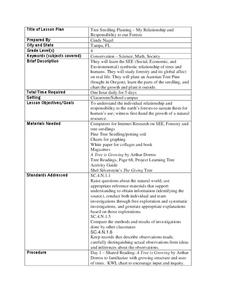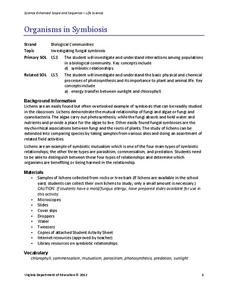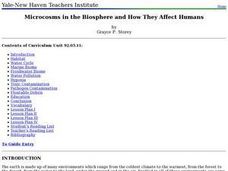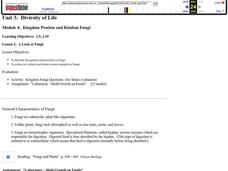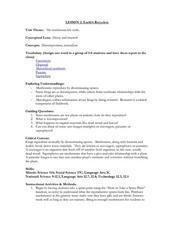Curated OER
Tree Seedling Planting- My Relationship and Responsibility to our Forests
In this trees lesson, 4th graders read the book, A Tree is Growing and complete a KWL chart on how trees grow and how they are used. Students research the symbiotic relationship of humans and trees, create tree collages, plant a...
Curated OER
The Flower and the Fly
It's like a biological "Beauty and the Beast!" The fascinating mutualism between a South African meganosed fly and a deep-throated geranium builds a case study in coevolution for your biology buffs to analyze. After reading about this...
Science Friday
Termite Symbiosis
What happens to the wood a termite eats? Pupils learn about the three types of symbiosis with pictures of symbiotic pairs. Afterward, they determine whether there is a symbiotic relationship with a termite by dissecting termites and...
Alabama Learning Exchange
Make a Difference!
We are very dependent upon other life forms around us to survive. Here, scholars explore relationships in the ecosystem with the help of Auntie Litter and the pollution patrol. They imagine a world without grass, making connections to...
Busch Gardens
Create an Invertebrate
What better way for young biologists to learn about invertebrates than by creating their very own? Here, students are assigned a set of invertebrate characteristics and are asked to invent an imaginary ocean animal...
Virginia Department of Education
Organisms in Symbiosis
Searching for an activity that allows emerging biologists to explore symbiosis up close and personal? Pupils collect samples and view lichens through a microscope and conclude with a discussion about the relationship they have...
Curated OER
Symbiotic Relationships
Seventh graders research types of symbiotic relationships on the Internet and explain what the effects would be in one of the species disappears. In this investigative instructional activity students use the Internet to do research...
Curated OER
Symbiotic Strategies
Students explore the different interspecies relationships namely mutualistic, commensal and parasitic. In this ecology instructional activity, students investigate an ecosystem disrupted by humans. They formulate an action plan to save...
Curated OER
Science: Microcosms in the Biosphere
In a series of lessons, examine the impact on humans by microcosms in the biosphere. Among the plans structured for students with different abilities and learning styles, are activities describing the symbiotic relationship, drawing the...
NOAA
Microfriends
Is there medicine found in the organisms that live deep below the surface of the ocean? The fifth lesson in a six-part series has learners team up to research bacteria and the relationship it has with nearly every living thing on Earth....
Science 4 Inquiry
Frenemies, Bros and Killers: A Lesson in Symbiosis
Animals and plants develop relationships and rely on each other to survive. Pupils learn more about symbiosis through a video, a hands-on matching activity, and a game. They differentiate and describe each type on a written evaluation.
Curated OER
Lesson #5: Symbiosis and Coral Anatomy
Fifth graders examine the basic structure of corals and the concept of symbiosis. They watch a Powerpoint Presentation, develop an original pair of organisms living symbiotically, and create an edible model of a coral polyp.
Curated OER
Changing Ecosystems
In this ecosystem worksheet, students will review terms associated with succession in an ecosystem plus the various relationships between organisms. This worksheet has 5 matching, 9 true or false, and 6 short answer questions.
Curated OER
Let's Make a Tubeworm!
Young scholars discuss deep-sea chemosynthetic communities then create a poster of a three-dimensional tubeworm. In this creative lesson students create their own tubeworm and write a written report on it.
Curated OER
Fungi
In this fungi learning exercise, students will review the different types of fungi and the structures these fungi have for reproduction and growth. This learning exercise has 5 terms used in word puzzles, 5 matching, and 5 true or false...
Curated OER
Ecology: Symbiosis
Eighth graders identify various types of symbiotic relationships. In this ecology lesson, 8th graders predict whether certain organisms can form symbiosis with other organisms. They discuss and defend their reasoning.
Curated OER
Build a Coral Polyp
Young scholars build a coral polyp out of a banana, straw, oyster crackers, sprinkles, and more. In this coral polyp lesson plan, students also list the differences between plants and animals.
Curated OER
Coral Polyp Party
Learners complete a project where they label the parts of a coral polyp and discuss the differences between plants and animals. Students use marshmallows, sprinkles, toothpicks, and more to label their coral polyp.
Curated OER
Biosphere Starts with?
How can your pupils test their biosphere vocabulary acquisition? They can do it by using a fill-in-the-blank worksheet like the one found here. Thirty-four common words and phrases surrounding the topic are included. There is a number 35...
Curated OER
Diversity of Life
Learners study fungi and its characteristics. In this fungi lesson students collect and observe fungi then answer questions on what they saw.
Curated OER
Origins Video Questions
In this biology worksheet, students complete 19 short answer questions about biodiversity and information obtained during a class video.
Curated OER
Blue Planet: Coral Seas
Students create a poster about coral reefs. In this oceanography lesson plan, students teach the class about a given aspect of the coral reefs. Students create posters with images and facts about this habitat.
Curated OER
Earth's Recyclers
Students work together in groups to report on different topics related to decomposition. They answer questions and share their answers with the class. They discuss any topic that is unclear.
Science Struck
Science Struck: Symbiotic Relationships in the Deciduous Forest
Explains what a symbiotic relationship is, the five main types of symbiosis, and provides examples of symbiotic relationships among living things in a deciduous forest.


